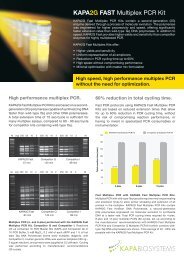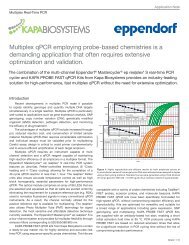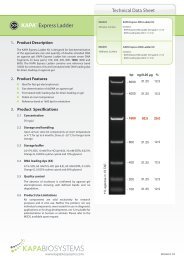KAPA Mouse Genotyping Kit - Kapa Biosystems
KAPA Mouse Genotyping Kit - Kapa Biosystems
KAPA Mouse Genotyping Kit - Kapa Biosystems
You also want an ePaper? Increase the reach of your titles
YUMPU automatically turns print PDFs into web optimized ePapers that Google loves.
<strong>KAPA</strong> <strong>Mouse</strong> <strong>Genotyping</strong> <strong>Kit</strong><br />
1. Product Description<br />
<strong>KAPA</strong> <strong>Mouse</strong> <strong>Genotyping</strong> <strong>Kit</strong>s include <strong>KAPA</strong> Express Extract, a<br />
novel thermostable protease and buffer system that allows the<br />
extraction of PCR-ready DNA from mouse tissue in as little as<br />
15 minutes, and <strong>KAPA</strong>2G Fast <strong>Genotyping</strong> Mix with dye, containing<br />
a DNA polymerase engineered via a process of molecular evolution<br />
for high processivity and extreme speed. The combination of <strong>KAPA</strong><br />
Express Extract and <strong>KAPA</strong>2G Fast <strong>Genotyping</strong> Mix allows for the<br />
reliable extraction and amplification of DNA fragments from mouse<br />
tissue in 1 hour, as compared to ≥1 day with conventional protocols.<br />
The <strong>KAPA</strong> Express Extract system has been designed for optimal<br />
tissue lysis and sample preservation. Tissue lysis is performed in a<br />
standard thermocycler, after which the sample is centrifuged and<br />
the DNA-containing supernatant recovered. Extracts may be used<br />
directly in PCR, without quantification. Unlike existing protocols<br />
that rely on proteinase K digestion, extractions using <strong>KAPA</strong> Express<br />
Extract are conveniently performed in a single-tube, without the<br />
need for hazardous chemicals and multiple washing steps. This<br />
greatly reduces the risk for sample loss and contamination. The<br />
process yields sufficient template for multiple assays and is easily<br />
scaled to handle samples in a 96-well format. Each extraction yields<br />
a sufficient amount of template for up to 100 x 25 µl PCRs, and may<br />
be diluted in TE Buffer for long-term storage at -20 °C.<br />
DNA extracted with <strong>KAPA</strong> Express Extract is then amplified with<br />
<strong>KAPA</strong>2G Fast <strong>Genotyping</strong> Mix (2X) with dye. The master mix is<br />
designed for routine Fast PCR, offering significant reductions in<br />
total reaction times (20 – 70%), as well as improved performance,<br />
compared to wild-type Taq DNA polymerase. Reduction in cycle<br />
time can be achieved without the requirement for specialized PCR<br />
consumables or thermocyclers. <strong>KAPA</strong>2G Fast <strong>Genotyping</strong> Mix (2X) is<br />
a ready-to-use master mix containing all components for Fast PCR,<br />
except primers and template. The 2X master mix contains <strong>KAPA</strong>2G<br />
Fast DNA Polymerase (with or without HotStart modification),<br />
<strong>KAPA</strong>2G Fast PCR Buffer, dNTPs (0.2 mM each dNTP at 1X), MgCl 2<br />
(1.5 mM at 1X) and stabilizers. The master mix with dye additionally<br />
contains two inert dyes, which allow for the analysis of reaction<br />
products by gel electrophoresis directly after completion of the<br />
PCR, i.e. without the need to add a DNA loading solution.<br />
www.kapabiosystems.com<br />
KK7302<br />
500 x 25 µl reactions<br />
KK7352<br />
500 x 25 µl reactions<br />
Quick Notes<br />
Technical Data Sheet<br />
<strong>Kit</strong> components<br />
<strong>KAPA</strong> <strong>Mouse</strong> <strong>Genotyping</strong> <strong>Kit</strong>s include:<br />
- 2 x 500 U <strong>KAPA</strong> Express Extract (1 U/µl)<br />
- 2 x 5 ml <strong>KAPA</strong> Express Extract Buffer (10X)<br />
- 1 x 6.25 ml <strong>KAPA</strong>2G Fast <strong>Genotyping</strong> Mix<br />
with dye (2X)<br />
<strong>KAPA</strong> <strong>Mouse</strong> <strong>Genotyping</strong> <strong>Kit</strong>s (HotStart) include:<br />
- 2 x 500 U <strong>KAPA</strong> Express Extract (1 U/µl)<br />
- 2 x 5 ml <strong>KAPA</strong> Express Extract Buffer (10X)<br />
- 1 x 6.25 ml <strong>KAPA</strong>2G Fast HotStart <strong>Genotyping</strong><br />
Mix with dye (2X)<br />
Storage, handling and specifications<br />
Store all components at –20 °C for long-term use. Please refer to<br />
Section 6 for full details.<br />
� Extract PCR-ready DNA from mouse tissue in a simple, singletube<br />
protocol (15 min), without the need for hazardous<br />
chemicals or multiple washing steps.<br />
� Use 1 µl DNA extract per 25 µl PCR. One extraction yields<br />
sufficient template for up to 100 x 25 µl PCRs if undiluted<br />
lysate is used.<br />
� DNA extracts may be diluted in TE Buffer (1:10) for long-term<br />
storage at -20 °C.<br />
� <strong>KAPA</strong>2G Fast <strong>Genotyping</strong> Mixes contain a novel DNA<br />
Polymerase (with or without HotStart), engineered<br />
specifically for Fast PCR, dNTPs (0.2 mM each dNTP final) and<br />
MgCl 2 (1.5 mM final).<br />
� Use annealing time of 15 sec or less.<br />
� Use 10 sec total extension time for most amplicons
2<br />
<strong>KAPA</strong> <strong>Mouse</strong> <strong>Genotyping</strong> <strong>Kit</strong><br />
3. DNA extraction protocol<br />
The <strong>KAPA</strong> Express Extract protocol for extraction of PCR-ready DNA from mouse tissue samples is the following:<br />
Notes:<br />
Step Description<br />
1. Reaction setup<br />
2. Lysis 1<br />
Combine the following in a thin-walled PCR tube and vortex to mix:<br />
PCR-grade water Up to 100 µl<br />
1 U/µl <strong>KAPA</strong> Express Extract Enzyme 2.0 µl<br />
10X <strong>KAPA</strong> Express Extract Buffer 10 µl<br />
<strong>Mouse</strong> tail or ear tissue ~2 mm 3 fragment or 2 mm 2 punch<br />
Incubate in a thermocycler for 10 min at 75 °C.<br />
During this step, cells are lysed, nucleases and proteins degraded and DNA released 2 .<br />
3. Heat-inactivation 1 Incubate for 5 min at 95 °C to inactivate the thermostable <strong>KAPA</strong> Express Extract protease.<br />
4. Sample recovery<br />
and use<br />
1. Vortex reaction product for 2 – 3 sec. Centrifuge at high speed for 1 min to pellet debris 3 .<br />
2. Transfer DNA-containing supernatant (~70 µl) to a fresh tube 4 .<br />
3. Use 1 µl of DNA extract directly in a 25 µl PCR, without quantification.<br />
4. Dilute in TE Buffer for long-term storage at -20 °C (optional).<br />
1 Program thermocycler to perform incubations at 75 °C and 95 °C consecutively and then cool reaction products to 4 °C.<br />
2 The tissue will not degrade completely, as is the case with Proteinase K digestions. This is normal, and not an indication of lysis failure.<br />
3The centrifugation step is optional. If the lysate will be stored long-term, then centrifugation and transfer to a fresh tube prior to dilution in TE<br />
is recommended.<br />
4 Transferring the lysate to a fresh tube is only required if the centrifugation will be performed.<br />
Reaction volume and final <strong>KAPA</strong> Express Extract Buffer concentration: 100 µl reactions, containing <strong>KAPA</strong> Express Extract Buffer at<br />
a final concentration of 1X, are recommended.<br />
Lysis and heat-inactivation: The lysis step at 75 °C may be varied between 5 and 15 min, but shorter or longer lysis times are not<br />
recommended. Inadequate lysis will result in low DNA yields, whereas excessive incubation at 75 °C may result in DNA damage. Please<br />
note that after the lysis reaction the tissue will not be completely degraded, as is the case with Proteinase K digestions. This is normal,<br />
and not an indication of lysis failure.<br />
Recovery of DNA-containing extract after lysis and enzyme de-activation (optional): Centrifugation of the reaction product for 1<br />
min at high speed is sufficient to pellet cellular debris, and the supernatant is easily recovered (~70 µl). In some cases, debris does not<br />
pellet but remains suspended throughout the reaction product. In such cases, it is recommended that the DNA-containing liquid be<br />
carefully transferred to a fresh tube for downstream use and storage.<br />
Contamination control: To minimize the risk of sample contamination, it is recommended that extraction reactions and downstream<br />
PCRs are set up in a PCR hood.<br />
Long-term storage of DNA extracts: DNA extracts generated with <strong>KAPA</strong> Express Extract may be stored at -20 °C for use in multiple<br />
PCRs over a period of time. A 1:10 dilution of the DNA extract in TE Buffer is recommended for long-term storage. This is done to ensure<br />
that the DNA is stored in a buffered environment. However, the dilution factor may be varied between 1:1 and 1:20, depending on the<br />
downstream application and yield of DNA. For downstream applications that are sensitive to EDTA, TE may be replaced with 10 mM<br />
Tris-HCl, pH 8.0 – 8.5.
<strong>KAPA</strong> <strong>Mouse</strong> <strong>Genotyping</strong> <strong>Kit</strong><br />
4. DNA amplification protocol<br />
4.1 Typical reaction setup:<br />
A typical reaction with <strong>KAPA</strong>2G Fast <strong>Genotyping</strong> Mix consists of the following:<br />
Component Final concentration Volume in a 25 µl 1 rxn<br />
PCR grade water – Up to 25.0 µl<br />
2X <strong>KAPA</strong>2G Fast <strong>Genotyping</strong> Mix 1X 12.5 µl<br />
MgCl 2 (25 mM)<br />
ONLY if final concentration >1.5 mM needed<br />
1.5 mM in 1X Master Mix<br />
0.5 µl for each<br />
0.5 mM MgCl 2 >1.5 mM<br />
Forward primer (10 µM) 0.50 µM 1.25 µl<br />
Reverse primer (10 µM) 0.50 µM 1.25 µl<br />
DMSO<br />
(for amplicons with a GC content >60%)<br />
5.0 – 7.5%<br />
Template DNA -<br />
1.25 - 1.875 µl<br />
of a 100% solution<br />
1 µl extract from <strong>KAPA</strong> Express<br />
Extract lysis reaction<br />
1For reaction volumes smaller than 25 µl, scale the volumes of all components down proportionately. Reaction volumes >25 µl<br />
are not recommended.<br />
4.2 Recommended <strong>KAPA</strong>2G Fast <strong>Genotyping</strong> Mix cycling parameters<br />
Cycling step Parameters<br />
Initial denaturation 3 min at 95 °C<br />
Denaturation 15 sec at 95 °C<br />
Annealing<br />
15 sec at optimal Ta<br />
(55 – 65 °C) 1<br />
Extension 10 - 30 sec/kb 2 at 72 °C<br />
No. of cycles 35 3<br />
Final extension 4 0 – 10 min at 72 °C<br />
1 For optimal results, design primers to have an optimal annealing<br />
temperature between 55 and 65 °C. Primers with lower annealing<br />
temperatures may be used, but annealing temperatures
<strong>KAPA</strong> <strong>Mouse</strong> <strong>Genotyping</strong> <strong>Kit</strong><br />
5. Troubleshooting<br />
Problem<br />
No or low yield of target<br />
fragment after PCR<br />
Smeary or non-specific<br />
amplification<br />
6. Storage, handling and specifications<br />
6.1 Shipping, storage and handling<br />
Possible solutions<br />
<strong>KAPA</strong> <strong>Mouse</strong> <strong>Genotyping</strong> <strong>Kit</strong>s are shipped on dry ice or ice packs, depending on the country of destination. Upon receipt, store the<br />
entire kit at -20 °C in a constant-temperature freezer. When stored under these conditions and handled correctly, all kit components<br />
will retain full activity for at least six months from the date of receipt, or until the expiry date indicated on the kit.<br />
Always ensure that all kit components are fully thawed and vortexed before use.<br />
<strong>KAPA</strong> <strong>Mouse</strong> <strong>Genotyping</strong> <strong>Kit</strong>s may be stored at 4 °C for regular, short-term use (up to 1 week). Provided that it has been handled<br />
carefully and not contaminated, the kit components are not expected to be compromised if left (unintentionally) at room<br />
temperature for short periods of time (up to 24 h). Long-term storage at room temperature or 4 °C is not recommended. Please note<br />
that reagents stored above -20 °C are more prone to degradation when contaminated by the user; storage at such temperatures is<br />
therefore at the user’s own risk.<br />
6.2 Quality control<br />
All components contained with <strong>KAPA</strong> <strong>Mouse</strong> Genotpying <strong>Kit</strong>s are subjected to stringent quality control tests, are free of<br />
contaminating exo- and endonuclease activities and meet strict requirements with respect to DNA contamination.<br />
6.3 Product use limitations and licenses<br />
<strong>KAPA</strong> <strong>Mouse</strong> <strong>Genotyping</strong> <strong>Kit</strong>s are developed, designed and sold exclusively for research purposes and in vitro use. Neither the<br />
product, nor any individual component, has been tested for use in diagnostics or for drug development, nor is it suitable for<br />
administration to humans or animals. Please refer to the MSDS, which is available on request.<br />
Certain applications of this product are covered by patents issued to parties other than <strong>Kapa</strong> <strong>Biosystems</strong> and applicable in certain<br />
countries. Purchase of this product does not include a license to perform any such applications. Users of this product may therefore<br />
be required to obtain a patent license depending upon the particular application and country in which the product is used.<br />
www.kapabiosystems.com<br />
� Increase lysis at 75 °C to 15 min to improve release of DNA.<br />
� Dilute DNA extract with TE or 10 mM Tris-HCl, pH 8.0 – 8.5 prior to PCR.<br />
� Use at least 40 PCR cycles.<br />
� Increase extension time to 20 or 30 sec per cycle.<br />
� Decrease annealing temperature by 2 – 5 °C, but not lower than 50 °C.<br />
� Ensure tail/ear tissue is completely immersed in buffer.<br />
For technical support, please contact support@kapabiosystems.com<br />
� Reduce number of PCR cycles to 35 or less.<br />
� Reduce annealing time to 15 sec and extension time to 5 – 10 sec per cycle.<br />
� Increase annealing temperature by 2 – 5 °C.<br />
� Prepare fresh primer stocks.<br />
Boston, Massachusetts, United States<br />
600 West Cummings Park, Suite 2250<br />
Woburn, MA 01801 U.S.A.<br />
Tel: +1 781 497 2933 Fax: +1 781 497 2934<br />
Cape Town, South Africa<br />
2nd Floor, Old Warehouse Building, Black River Park,<br />
Fir Road, Observatory 7925, Cape Town, South Africa<br />
Tel: +27 21 448 8200 Fax: +27 21 448 6503<br />
Email: info@kapabiosystems.com










